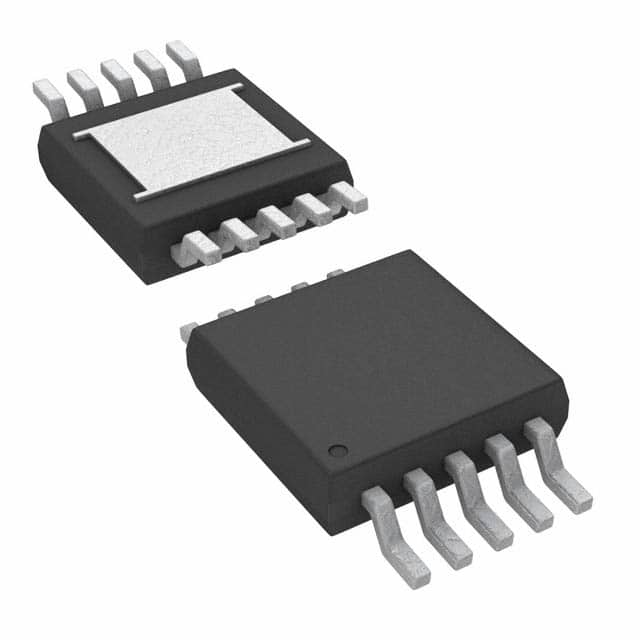LTC1403ACMSE#PBF
Product Overview
Category: Integrated Circuit (IC)
Use: Analog-to-Digital Converter (ADC)
Characteristics: - High-resolution ADC - Low power consumption - Small form factor - Wide input voltage range - Serial interface for easy integration
Package: MSOP-10
Essence: The LTC1403ACMSE#PBF is a high-performance, low-power, 14-bit ADC designed for various applications that require accurate analog-to-digital conversion.
Packaging/Quantity: The LTC1403ACMSE#PBF is available in tape and reel packaging with a quantity of 250 units per reel.
Specifications
- Resolution: 14 bits
- Input Voltage Range: ±10V
- Conversion Rate: 1.25 MSPS (Mega Samples Per Second)
- Power Supply: 2.7V to 5.5V
- Operating Temperature Range: -40°C to 85°C
- Interface: Serial (SPI-compatible)
Pin Configuration
The LTC1403ACMSE#PBF has the following pin configuration:
```
| | --| VDD GND |-- Power Supply --| SCK SDI |-- Serial Clock and Data Input --| CS SDO |-- Chip Select and Serial Data Output --| VIN+ VIN- |-- Differential Analog Input |___________| ```
Functional Features
- High-resolution conversion: The LTC1403ACMSE#PBF offers 14-bit resolution, allowing for precise analog-to-digital conversion.
- Low power consumption: Designed with power efficiency in mind, this ADC minimizes energy consumption without compromising performance.
- Wide input voltage range: With a ±10V input voltage range, it can handle a wide variety of analog signals.
- Serial interface: The SPI-compatible serial interface simplifies integration with microcontrollers and other digital systems.
Advantages and Disadvantages
Advantages: - High resolution for accurate conversion - Low power consumption for energy efficiency - Small form factor for space-constrained applications - Wide input voltage range for versatility - Easy integration with a serial interface
Disadvantages: - Limited to 14-bit resolution, may not be suitable for applications requiring higher precision - Requires an external microcontroller or digital system for control and data processing
Working Principles
The LTC1403ACMSE#PBF operates on the principle of successive approximation. It samples the analog input voltage and converts it into a digital representation using a series of comparisons. The internal circuitry adjusts the conversion process to achieve high accuracy and minimize errors.
Detailed Application Field Plans
The LTC1403ACMSE#PBF is well-suited for various applications that require precise analog-to-digital conversion, such as: 1. Industrial automation systems 2. Data acquisition systems 3. Medical instrumentation 4. Test and measurement equipment 5. Audio signal processing
Detailed and Complete Alternative Models
- LTC1403AIMSE#PBF: Similar to LTC1403ACMSE#PBF but in an MSOP-10 package.
- LTC1403CMS8#PBF: Similar to LTC1403ACMSE#PBF but in an SOIC-8 package.
- LTC1403AHMS8#PBF: Higher-grade version of LTC1403CMS8#PBF with improved specifications.
These alternative models offer similar functionality and performance but may differ in package type or additional features.
In conclusion, the LTC1403ACMSE#PBF is a high-resolution ADC with low power consumption and a wide input voltage range. Its small form factor and serial interface make it suitable for various applications. While it has some limitations, such as the 14-bit resolution, it provides accurate analog-to-digital conversion for many practical scenarios.
Lista 10 Vanliga frågor och svar relaterade till tillämpningen av LTC1403ACMSE#PBF i tekniska lösningar
Sure! Here are 10 common questions and answers related to the application of LTC1403ACMSE#PBF in technical solutions:
Q: What is LTC1403ACMSE#PBF? A: LTC1403ACMSE#PBF is a high-performance, 14-bit analog-to-digital converter (ADC) manufactured by Linear Technology.
Q: What is the operating voltage range of LTC1403ACMSE#PBF? A: The operating voltage range of LTC1403ACMSE#PBF is typically between 4.75V and 5.25V.
Q: What is the maximum sampling rate of LTC1403ACMSE#PBF? A: LTC1403ACMSE#PBF has a maximum sampling rate of 1.25 MSPS (Mega Samples Per Second).
Q: What is the resolution of LTC1403ACMSE#PBF? A: LTC1403ACMSE#PBF has a resolution of 14 bits, which means it can represent analog signals with 2^14 (16,384) discrete levels.
Q: Can LTC1403ACMSE#PBF be used for both single-ended and differential input signals? A: Yes, LTC1403ACMSE#PBF supports both single-ended and differential input signals.
Q: What is the input voltage range of LTC1403ACMSE#PBF? A: The input voltage range of LTC1403ACMSE#PBF is typically between 0V and VREF, where VREF is the reference voltage.
Q: Does LTC1403ACMSE#PBF have an integrated reference voltage source? A: No, LTC1403ACMSE#PBF requires an external reference voltage source for proper operation.
Q: What is the power consumption of LTC1403ACMSE#PBF? A: The power consumption of LTC1403ACMSE#PBF depends on the sampling rate and other factors but typically ranges from 10mW to 50mW.
Q: Can LTC1403ACMSE#PBF operate in a wide temperature range? A: Yes, LTC1403ACMSE#PBF is designed to operate in a wide temperature range, typically from -40°C to +85°C.
Q: What are some typical applications of LTC1403ACMSE#PBF? A: LTC1403ACMSE#PBF is commonly used in various applications such as data acquisition systems, industrial automation, medical instrumentation, and communication equipment.
Please note that the answers provided here are general and may vary depending on specific datasheet specifications and application requirements.


